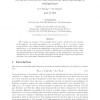Free Online Productivity Tools
i2Speak
i2Symbol
i2OCR
iTex2Img
iWeb2Print
iWeb2Shot
i2Type
iPdf2Split
iPdf2Merge
i2Bopomofo
i2Arabic
i2Style
i2Image
i2PDF
iLatex2Rtf
Sci2ools
103
Voted
QUESTA
2007
2007
On queues with service and interarrival times depending on waiting times
We consider an extension of the standard G/G/1 queue, described by the equation W D = max{0, B − A + Y W}, where P[Y = 1] = p and P[Y = −1] = 1 − p. For p = 1 this model reduces to the classical Lindley equation for the waiting time in the G/G/1 queue, whereas for p = 0 it describes the waiting time of the server in an alternating service model. For all other values of p this model describes a FCFS queue in which the service times and interarrival times depend linearly and randomly on the waiting times. We derive the distribution of W when A is generally distributed and B follows a phase-type distribution, and when A is exponentially distributed and B deterministic.
Related Content
| Added | 27 Dec 2010 |
| Updated | 27 Dec 2010 |
| Type | Journal |
| Year | 2007 |
| Where | QUESTA |
| Authors | Onno J. Boxma, Maria Vlasiou |
Comments (0)

